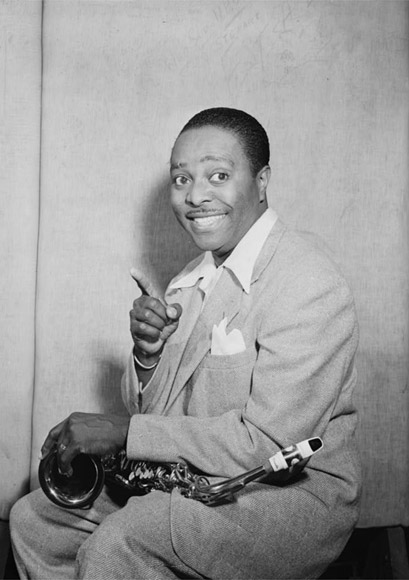I identify myself with Louis Jordan more than any other artist
~Chuck Berry
In the Rock and Roll Hall Of Fame Museum: Louis Jordan:
From Wikipedia:
Louis Thomas Jordan (July 8, 1908 – February 4, 1975) was a pioneering American jazz, blues and rhythm & blues musician,songwriter and bandleader who enjoyed his greatest popularity from the late 1930s to the early 1950s. Known as “The King of the Jukebox”, Jordan was highly popular with both black and white audiences in the later years of the swing era. In 2004, Rolling Stone Magazine ranked him #59 on their list of the 100 Greatest Artists of All Time.
Jordan was one of the most successful African-American musicians of the 20th century, ranking fifth in the list of the all-time most successful black recording artists according to Billboard magazine’s chart methodology.
Influence on popular music
- Louis Jordan is described by the Rock and Roll Hall of Fame as “the Father of Rhythm & Blues” and “the Grandfather of Rock ‘n’ Roll.”
- He is one of a number of seminal black performers who are often credited with inventing rock and roll, or at least providing many of the building blocks for the music
- Jordan was the greatest post-war exponent of the jump blues style, one of the prototypes of rock and roll
- Jordan also strongly influenced Bill Haley & His Comets, whose producer, Milt Gabler, had also worked with Jordan and attempted to incorporate Jordan’s stylings into Haley’s music
- Among Jordan’s biggest fans were Little Richard and Chuck Berry. Berry clearly modeled his musical approach on Jordan’s, changing the text from black life to teenage life, and substituting cars and girls for Jordan’s primary motifs of food, drink, money and girls.
- Jordan’s guitarist, Carl Hogan, was a particularly direct influence on Berry’s guitar style, as can be heard on the 1946 hit “Ain’t That Just Like A Woman”; Hogan’s opening single-note solo on the song was lifted essentially note-for-note by Berry on his iconic opening riff on “Johnny B. Goode”
- James Brown has also specifically cited Jordan as a major influence because of his multi-faceted talent. In the 1992 documentary Lenny Henry Hunts The Funk Brown said that Jordan had influenced him “… in every way. He could sing, he could dance, he could play, he could act. He could do it all.”
Buzz Me Baby:
Jazz Session – Louis Jordan & his tympany five 1974 (30min):
Louis Jordan – Best Of Louis Jordan, 38 crazy swinging Jazz tracks by the “King of the Jukebox”:
00:00 – After School Swing Session
02:37 – Dirty Snake
04:59 – How About That
07:58 – My Baby Said Yes
10:58 – Caldonia Boogie
13:41 – Reconversion Blues
16:06 – Texas And Pacific
19:12 – Open The Door Richard
22:16 – June Tenth Jamboree
25:02 – I’m Gonna Move To The Outskirts Of Town
27:56 – Mop Mop
30:54 – Knock Me A Kiss
33:43 – Your Socks Don’t Match
36:44 – It’s So Easy
39:39 – Reet Petite And Gone
42:26 – Let The Good Time Roll
45:17 – You’re Much Too Fat
48:01 – Inflation Blues
51:02 – Sure Had A Wonderful Time
54:08 – Honeysuckle Rose
57:16 – Oh Boy I’m In The Groove
01:00:05 – G.I. Jive
01:03:07 – Five Guys Named Moe
01:06:07 – Buzz Me
01:08:59 – Early In The Morning
01:12:23 – Choo Choo Ch’ Boogie
01:15:10 – Run Joe!
01:18:23 – Morning Light
01:20:46 – Don’t Let the Sun Catch You Crying
01:24:02 – Baby It’s Cold Outside
01:26:46 – I’ll Never Be Free
01:29:58 – Ain’t Nobody’s Business
01:33:13 – Somebody Done Change the Lock On My Door
01:36:30 – Barnyard Boogie
01:39:18 – Every Man to His Own Profession
01:42:37 – All the Love of Lil
01:45:31 – Ain’t That Just Like a Woman?
01:48:26 – Ration Blues
-Egil


